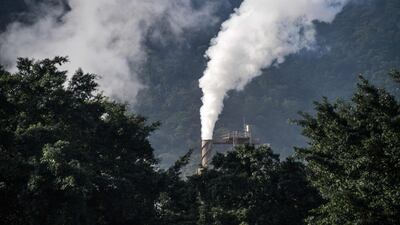Live updates: Follow the latest news on Cop28
Non-profit groups have hailed the early progress made at Cop28, but said that the final text of the global stocktake must be clear on the need for emissions cuts.
As Cop28 enters its second week, there are concerns from some organisations that caveats could limit the impact that any agreement has on the phasing out of fossil fuels.
Campaigners have also said that the final global stocktake text – which is poised to be the central outcome of Cop28 – should also highlight the potential for nature-based solutions to mitigate the effects of climate change.
WWF
Dr Sandeep Sengupta, global policy lead for climate change at the International Union for Conservation of Nature, said that the conference "went off to a really strong start" in securing financial pledges for the loss and damage fund established at Cop27 last year in Egypt.
But the conclusion of a recent UN report that current nationally determined contributions (NDCs) – the commitments countries make on how they will manage their greenhouse gas emissions – only add up to a two per cent reduction in emissions by 2030, compared with 2019 levels.
He said this falls far short of the 43 per cent reduction needed to avoid the worst effects of climate change.
The global stocktake must send a "strong signal" that economies must change in order to "keep 1.5°C alive" and "recognise the role the world’s ecosystems can play" in adapting to and mitigating the extent of climate change.
"The global stocktake is really the instrument that needs to succeed if the world is to get on the 1.5° trajectory," he told The National.
Limiting global average temperature rises to 1.5°C above pre-industrial levels was the central aim of the 2015 Paris Agreement, with scientists saying that greater increases could lead to climate change having much more severe consequences.
He called for "enhanced climate finance" for mitigation, adaptation and loss and damage, "with an increased proportion being made available to indigenous peoples and local communities".
Observers are looking at whether the final global stocktake text describes the need for a "phase-out" of fossil fuels rather then the "phase-down" agreed at Cop26 in Glasgow.
Rhiannon Niven, senior policy manager for climate and energy at Birdlife International and co-chairwoman of ecosystems for the Climate Action Network, said that a phase out was "absolutely integral".
She said that mentions of "nature-based solutions" to climate change – while highlighted as important by many environmental organisations – should not become "a distraction to compensate for business as usual" on emissions.
"It has to happen together," Ms Niven said, adding that the world needed to protect at least 30 per cent of land and oceans for nature, as agreed at the UN biodiversity summit in Montreal last year, to stop the world going "past its tipping point and its ability to adapt".
She said at this Cop, and over the past two years, there had been much greater discussion about how preserving nature was central to dealing with climate change.
"It needs to be translated to the text and implementation on the ground," she added.
"Having parties coming out and pushing this at the party-to-party level shows there’s momentum. We’re seeing more and more countries signing up to this and governments committing to landing it in the text. We need to get these hard references in the text."
According to Florence Laloe, senior director for climate policy at Conservation International, mentions of land use and agriculture were proving to be "a tricky part" of the final text, largely because of push-back from countries whose emissions were connected to land use.
Changes in land use, notably converting forested areas to agricultural use, are a significant contributor to climate change.
Entering the second week of Cop28, Shirley Matheson global NDC enhancement director at WWF, said that she was "cautious because there’s so much on the table".
"I’m happy the consistent discussion has been 1.5°C," she said. "There’s some [delegates] coming out with very strong views on fossil fuels we haven’t heard before, but there’s so many options on the table."
In terms of the global stocktake, she said that there was "a lot of expectations for week two" but the signals were that it was "going in a positive direction".
Sara Shaw, climate justice and energy international programme co-ordinator at the environmental organisation Friends of the Earth, expressed concerned about the use of the term "unabated" fossil fuels in draft texts.
If texts only pledge the phase-out of unabated fossil fuel use, this would open up "a colossal loophole" for the continued burning of fossil fuels, she said.
"We’re quite worried. The word abatement has been hanging around for quite a long time," she said. "We’re so opposed to another use of the word unabated. It’s so unhelpful even if it’s refined down."


